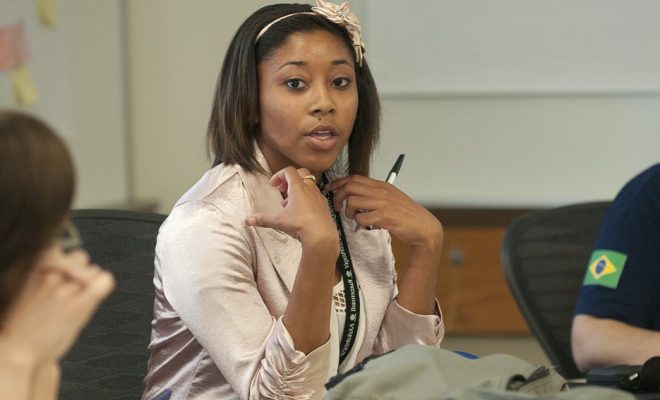How to improve digital writing

**The Edvocate is pleased to publish guest posts as way to fuel important conversations surrounding P-20 education in America. The opinions contained within guest posts are those of the authors and do not necessarily reflect the official opinion of The Edvocate or Dr. Matthew Lynch.**
A guest column by Christopher Profeta
The impact of social media on student writing is an important one in education today. With some suggesting it has caused grammar problems and an oversimplification of complex ideas, and others saying it has encouraged students to express themselves in writing, it is helpful to look at the research on the issue. One aspect, however, where there is basic agreement, is that typical social media writing is often not something of which the average English instructor would approve.
And so, the question arises, not so much how can writing teachers use social media to improve persuasive and argumentative writing, but how can they make sure students understand that there is a practical application to the concepts and skills being taught in their classes? In a 21st century world where so much communication is done in the form of digital writing, educators can do more than simply improve students’ writing, they can improve their students’ digital citizenship and participation in the world around them.
One of the great things about social media in the classroom is that it promotes student engagement. Prior to social media sites like Facebook and Twitter, educators were attempting to engage students online through various Learning Management Systems that allowed teachers to post class content, host discussion boards, and allow students to contribute to the discussion in writing.
A recent study of remote learning looks at students in an overseas Web Design course and how Facebook can be used to increase student engagement. The social media site was used in conjunction with the Learning Management System Moodle. Researchers tracked Facebook engagement by recording all activity such as wall postings, likes, shares of media, and student interactions with classmates. Additionally, students were given a survey at the end of the semester. Overall, researchers saw a 75% positive reaction to the use of social media in the classroom.
When compared to the LMS, students feel Facebook allows for easier posting of external links and easier communication with other students. Students say the LMS does not allow them to comment on posts and videos without a preexisting discussion forum. They also find the general design of the LMS to be less inviting than Facebook and complain that it is not possible to use with a mobile device unlike Facebook.
Furthermore, one of the benefits of social media is that students do not typically have to access any new platform, they are already on Facebook or Twitter, or some other social networking site. It is part of their everyday behavior. The problem is, they don’t frequently see it as being used for academic purposes, so at those times when social media discussions may veer toward more serious worldly or professional topics, they are uncomfortable or unable to shift their writing style to meet the needs of the new situation. Students cannot be expected to understand how to make that shift in order to effectively communicate an idea or a piece of information in a venue in which they are used to communicating so informally unless they are taught how.
Another study reported in the Journal of Computer Assisted Learning looks at the use of Twitter in a beginning level 14 week long college health class. Four sections of the class used the social media platform and three sections did not. Twitter was used to continue discussions outside of class, allow students a low-stress way to ask questions, send class and campus event reminders, and organize project and study groups.
In the final week of the class, student engagement was measured using the established National Survey for Student Engagement. Using a 19 item scale, researchers find a 123% increase in student engagement in the classes that use Twitter versus those that do not. The survey also shows that the use of Twitter improves student-faculty interactions and promotes collaboration among students. It also shows an increase in active learning and prompt instructor feedback to students.
The fact that student engagement rises with social media so much is astounding, but it also makes the obvious point that student’s like communicating in this way on academic topics as well as personal ones. The audiences and the styles used vary differently, but writing instructors have a captive audience of students who are essentially asking to be taught how to communicate effectively in writing through social media.
Teachers have noticed this. A survey of about 2,500 Advanced Placement and National Writing Project teachers shows clear majorities that believe digital communications such as social media have a positive academic impact. 96% say it allows students to share their work with a wider audience, 79% say it encourages student collaboration, and 78% say it improves creativity. As a result, the teachers surveyed feel that the use of social media in the classroom causes students to have a greater personal investment in their writing. 56% say that digital tools made their students’ writing better because it makes the revision process easier by allowing more collaboration among students.
The teachers surveyed, however, are not without their concerns. 68% say that digital writing causes students to put less effort into their writing. This makes clear the need for students to be taught that the skills they are learning in their English and Writing classes have very practical applications in a digital world where they will have to be able to clearly express new and unique thoughts in writing largely done online.
All this data clearly suggests that not only does the use of social media in the classroom improve writing skills, but that argumentative and persuasive writing classes are more important than ever for 21st century learners. If writing instructors are not making sure that students see the practical applications of good writing skills both inside and outside of the classroom, then they are doing their students a grave disservice. If educators do focus on how students can apply what they have been taught, students will be able to be productive and responsible digital and global citizens capable of thinking critically and communicating effectively.
__________________
Christopher Profeta is a writing instructor at Macomb Community College. He has a BA in English from Michigan State University and an MA in English from Wayne State University. He lives in Grosse Pointe Woods, MI with his wife and three children.






